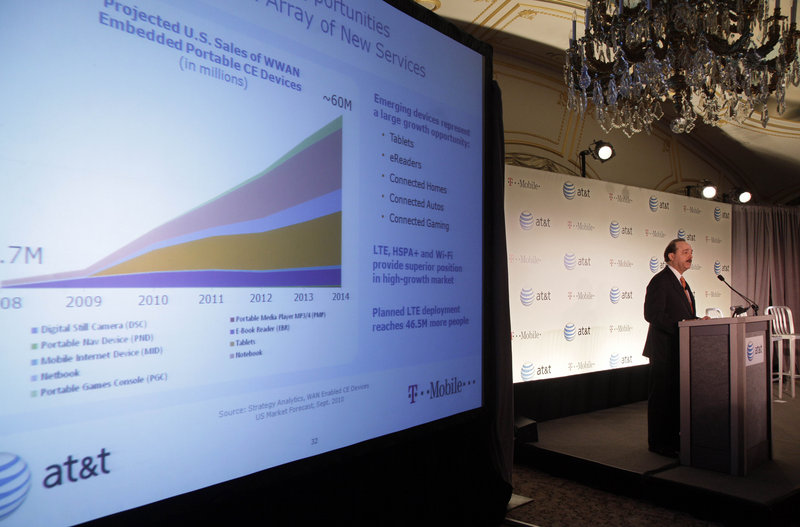NEW YORK — AT&T says it wants to buy T-Mobile USA to acquire more airwaves to support the growing use of data-hungry devices such as the iPhone. But if that’s the case, the T-Mobile deal isn’t much of a solution.
Having the right to use airwaves, or wireless spectrum, is essential to phone companies. More spectrum means more phone calls and more data can be carried in the same area.
But AT&T Inc. already has an ample supply of unused wireless spectrum that it plans to use to expand its network over the next several years. And much of T-Mobile’s spectrum is already in use, so the deal won’t result in fresh airwaves becoming available.
“The notion that there’s a spectrum crisis has been greatly exaggerated for (the) political purposes of a few select companies like AT&T,” said Derek Turner, research director at public-interest group Free Press in Washington.
In fact, AT&T has made great strides in addressing network congestion in such cities as New York and San Francisco not by tapping its unused spectrum, but by upgrading its cell-tower equipment.
AT&T has reasons besides spectrum gains to pay $39 billion for T-Mobile. For one, it hopes to persuade many of T-Mobile’s customers to switch to smartphones, which carry higher monthly fees. That’s an argument that appeals to investors, but not to regulators at the Federal Communications Commission and the Department of Justice, both of which will be reviewing the deal.
In a conference call with investors Monday, AT&T CEO Randall Stephenson said the company is facing “impending spectrum shortages in major markets.”
“AT&T has been at the leading edge of mobile data growth on our network as a result of supporting more smartphones, more tablets, more e-readers than anyone else in the country,” he said. “This has created an urgent need, an ongoing need, for significantly more spectrum to support this explosive demand.”
Mobile data usage has indeed exploded over the last few years, but AT&T’s own figures indicate that growth is slowing down now that smartphones are already in many hands.
Speaking to investors and journalists after the deal was announced, Stephenson said several times that the company’s mobile data volumes have increased 80-fold over four years — since the launch of the iPhone. But he also said he expects data volumes to grow eight to 10 times over the next five years, a much lower rate.
AT&T and its chief competitor, Verizon Wireless, have healthy spectrum holdings, thanks in large part to a government auction of old TV airwaves in 2008.
Sprint Nextel Corp., the No. 3 wireless provider, has huge amounts of spectrum available to it. That spectrum, too, is largely unused, but some technical considerations make it more difficult to exploit than Verizon’s and AT&T’s holdings.
AT&T has enough airwaves that it agreed to transfer some of its spectrum holdings to T-Mobile USA, along with a $3 billion breakup fee, if the deal is blocked by regulators.
Today, if AT&T’s data network is overloaded in an area, the traffic doesn’t move over to T-Mobile’s network, even if there’s spare capacity there. But that would happen after the two companies combine, resulting in better utilization.
But the logical extension of that argument is that we could make even better use of the airwaves if we had only one wireless company in the nation — a monopoly. The economics already point in that direction: The No. 3 and 4 carriers, T-Mobile and Sprint, have been struggling for years against the industry leaders, AT&T and Verizon Wireless.
Send questions/comments to the editors.



Success. Please wait for the page to reload. If the page does not reload within 5 seconds, please refresh the page.
Enter your email and password to access comments.
Hi, to comment on stories you must . This profile is in addition to your subscription and website login.
Already have a commenting profile? .
Invalid username/password.
Please check your email to confirm and complete your registration.
Only subscribers are eligible to post comments. Please subscribe or login first for digital access. Here’s why.
Use the form below to reset your password. When you've submitted your account email, we will send an email with a reset code.